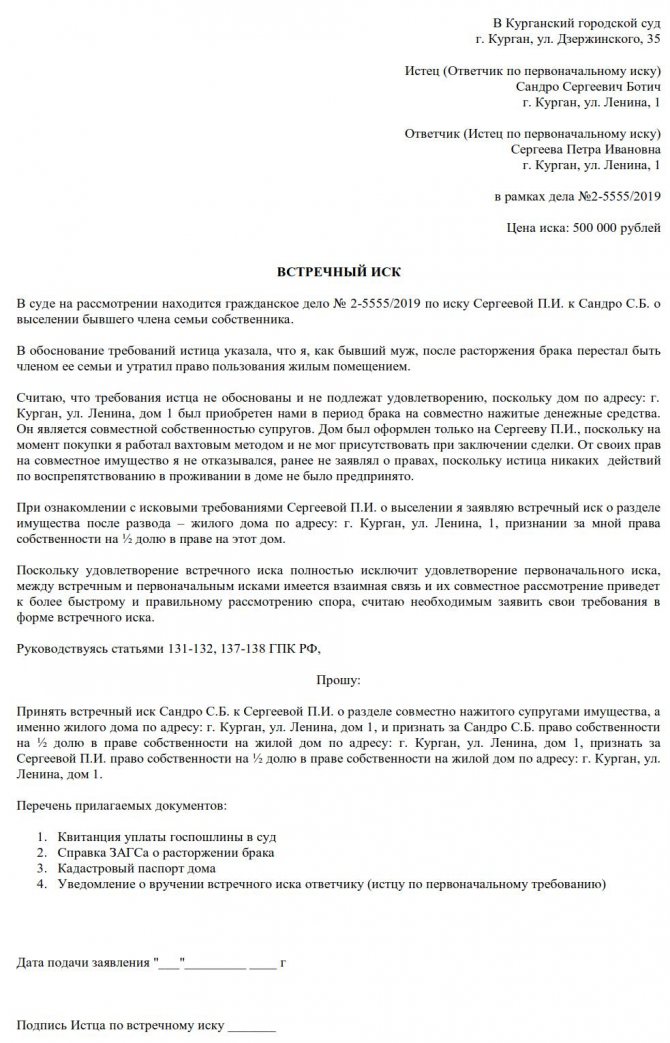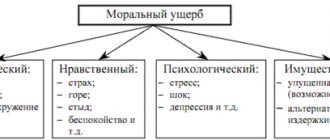When to serve
In the court of first instance, a counterclaim can be filed before the court retires to the deliberation room (Article 137 of the Code of Civil Procedure of the Russian Federation) - in fact, at any time during the process, until the final decision is made.
In the appeal procedure, the defendant has the right to present demands only if the court proceeded to consider the case according to the rules of the first instance (Part 6 of Article 327 of the Code of Civil Procedure of the Russian Federation, position of the Supreme Court of the Russian Federation).
Lawyers recommend filing a counter-statement to the statement of claim as early as possible, preferably at the stage of preparing the case for trial (this is the very first court hearing). Otherwise, the consideration of the dispute may be delayed. In particular, the judge has the right to postpone the proceedings in order to provide the parties with time to prepare, taking into account the presentation of new demands and the disclosure of circumstances in the case (Part 1 of Article 169 of the Code of Civil Procedure of the Russian Federation, paragraph 10 of the Resolution of the Plenum of the Supreme Court of the Russian Federation No. 13 of June 26, 2008).
Where are considered
A party to a case submits a counterclaim in a civil proceeding within the framework of an already existing case - to the judge who is considering the original claim (Part 2 of Article 31 of the Code of Civil Procedure of the Russian Federation).
If the legal proceedings are before the magistrate, and the counterclaims are within the jurisdiction of the district court, it is still necessary to send the claim to the magistrates. If they accept the documents, they will transfer the case for consideration according to jurisdiction (Part 3 of Article 23 of the Code of Civil Procedure of the Russian Federation).
Send the paper document by mail or submit it to the office. To do this, it is recommended that you familiarize yourself with the rules for submitting documents, which are published on the website of the judicial authority.
For the electronic version, the general procedure applies - submission through your personal account on the website of the State Automated System "Justice".
Conditions for filing a counterclaim
A counterclaim can be filed by the defendant himself or his representative. In the latter case, the subject must have a document confirming his authority. This is a power of attorney.
It can specify the specific powers of the person. A copy of the power of attorney must be attached to the counterclaim. If the representative participates in the proceedings from the very beginning, then the document is present in the case materials from the first stage. Accordingly, there is no need to re-attach it to the claim.
If the above conditions are not met, the court has the right not to accept the application and makes a ruling. Moreover, such a refusal, in accordance with the provisions of the Resolution of the Plenum of the Supreme Council No. 13 of 2008, is not subject to appeal.
We suggest you read: Is it possible to privatize an apartment for a minor child?
The defendant in such cases has the right to present his claims as part of an independent application. Such a claim will be considered in a separate process.
A reference in the appeal to the dismissal of the counterclaim by the first instance is not grounds for canceling the decision.
It should be taken into account that if the demands are withdrawn, it will be impossible to re-apply to the court with them in relation to the same entity. After a ruling has been made to satisfy the petition, the proceedings on the claim are completed.
The court must explain to the applicant the consequences of refusal of claims.
The conditions under which a defendant can simultaneously become a plaintiff are determined by law. There are three such conditions in total.
Only in these situations will the court accept a counterclaim and consider it in conjunction with the originally stated claims.
- A counterclaim partially or completely extinguishes the plaintiff’s originally stated claims against the defendant. A striking example is the case of a neighbor’s bay and a loan
- As a result of the satisfaction of the counterclaim, the satisfaction of the original claim is completely or partially excluded. An example of declaring a contract invalid, under which collection is made
- There is a mutual connection between the defendant’s counterclaim and the claims filed against him; joint consideration of these claims will make it possible to more quickly and correctly consider the legal dispute. This option is used to save procedural time, the court receives a more complete picture of the legal dispute
A third party cannot file a counterclaim, because no claims have been brought against him.
A third party may submit an independent application. In this case, it becomes a third party with independent claims on the subject of the dispute.
But this will no longer be a counterclaim.
A counterclaim is filed according to the same rules as the original claim.
The counterclaimant also pays the state fee if there are no grounds for exemption from paying it, etc.
The conditions under which a counterclaim can be filed in a district court or before a magistrate are no different from filing a counterclaim in an arbitration court.
A counterclaim can be filed both at a court hearing (preliminary or main) and between sessions through a court expedition.
After filing a counterclaim, the civil case begins from the very beginning.
The plaintiff may submit to the court an objection to the counterclaim (in civil proceedings) or a response to the counterclaim (in arbitration proceedings).
A counterclaim can only be filed if the court of appeal overturned the appealed court decision and proceeded to consider the civil case according to the rules of the court of first instance.
In this case, the conditions for accepting a counterclaim and the requirements for such a statement remain the same as in the court of first instance.
- If the claims set out in the counterclaim are within the jurisdiction of the district court, and the claims under the original claim are filed in the magistrate’s court, then the consolidated claims are sent for joint consideration to the district court.
- After receiving a counterclaim, the judge must postpone the trial. That is, set another date for the trial. This is done to give the party the opportunity to study the documents and prepare their position.
Requirements for a claim
There is an established procedure for filing a counterclaim in a civil case, which must be followed. So, the judge will accept it only if (Article 138 of the Code of Civil Procedure of the Russian Federation) a number of requirements are met.
- Such a claim is aimed at offsetting the original claim. For example, the plaintiff asks to recover a penalty for late payment for work, and the contractor presents a penalty for the delay in completing repairs. If the counterparty has already filed a statement of claim, the other party has the right to terminate its obligation by offset only by filing its own claim within the framework of the already initiated legal proceedings (see the position of the RF Armed Forces, the Supreme Arbitration Court of the Russian Federation). Other conditions required for credit must also be met.
- Satisfaction of the counterclaim and the original claim at the same time is permitted only in part, but not in full. For example, judges often side with citizens who have received a loan in disputes with banks, declaring clauses in contracts invalid and reducing the amount of debt.
- The claims are interrelated and their joint consideration will lead to a prompt and fair consideration of the case.
When establishing a pre-trial procedure for resolving a dispute, the judicial body will issue an example of a claim only if it is complied with. This conclusion follows from the interpretation of Art. 137 Code of Civil Procedure. In the absence of evidence of compliance with this procedure in the package of documents, the judicial authority has the right to return the counterclaim on the basis of clause 1 of part 1 of Art. 135 of the Code of Civil Procedure of the Russian Federation (Appeal ruling of the Novgorod Regional Court dated May 31, 2017 in case No. 33-1142/2017).
Counterclaim from Doc-Online Ru
The form of the counterclaim must be drawn up in accordance with the conditions specified in Articles 131 and 132 of the Code of Civil Procedure. There is a certain procedure for presenting a counterclaim, in case of violation of which the court may:
- return the claim to the applicant;
- refuse acceptance.
It is important to take into account that the jurisdiction of counterclaims is not determined by a general rule: special conditions apply to them. The counterclaim is filed by the defendant at the place of consideration of the original claim. The court makes one decision, which simultaneously clarifies the court's position regarding the requirements for the counterclaim and the main claim.
The defendant has the right to make counterclaims at any stage of the process, but until a decision is made on the merits.
If a counterclaim is filed at the preparatory stage, it will be considered together with the original claims.
Theoretically, the defendant has the opportunity to present claims even after the judge has retired to the deliberation room. However, the likelihood that an authorized person will recognize the need to establish new circumstances is extremely low. If, nevertheless, a corresponding determination is made, the proceedings must be continued. Upon further consideration, the defendant may defend his interests on the basis of a counterclaim.
The filing of claims is carried out according to the general rules enshrined in the Code of Civil Procedure. In the counter-statement, the defendant must indicate:
- The name of the authority to which the claims are submitted.
- Full name of the parties, contact details.
- Cost of claim.
- Case number.
- The essence of the plaintiff's demands. The applicant's claims should be briefly described here.
- Contents of counterclaims, grounds for their presentation.
- List of attached documents.
- Date of compilation.
The claim is signed by the defendant or his representative (if he has the appropriate authority).
The procedure for its presentation is regulated by the provisions of Article 132 of the APC. It is similar to the scheme provided for in the Code of Civil Procedure.
The general rules for filing a claim are enshrined in norms 125-130 of the APC. You can submit an application until a decision is made on the merits. The claim is sent to the authority considering the initial claims.
When filing a counterclaim within the framework of arbitration proceedings, the defendant also needs to pay a fee. If the court accepts the requirements for consideration, the dispute proceedings will begin anew.
A counterclaim can be filed if the civil defendant has claims against the civil plaintiff on the same dispute (under one legal relationship), for example, within the framework of one contract. Important conditions under which a claim can be filed are the absence of a judicial act on the main (initial) claim, as well as compliance with the limitation periods provided for in Chapter 12 of the Civil Code of the Russian Federation.
The claim is filed with the court hearing the original claim. It will be considered by the same judge who is the presiding judge in the main civil case. Such a claim is subject to general requirements for the preparation and filing of this document.
| You can easily solve any legal problems with the help of lawyers registered on the site - you set the price for completing the task (consult, draw up a claim, file a complaint, etc.), and the lawyers submit applications for your task, you just have to choose the best one. Leave a task: | |
When compiling it, the following must be indicated:
- -the organ to which it is supplied;
- -the person who serves it;
- -each party to the case (plaintiff and defendant), their addresses, telephone numbers and facts (optional);
- - what is the violated right of the defendant or the threat of its violation, listing the main circumstances of the dispute; a specific article of a regulatory legal act may be indicated that provides for liability for the specified violation;
- - if the claim is subject to assessment, then the price of the claim and its calculation are indicated;
- - information about the defendant’s acceptance of the claim procedure for resolving the dispute, if provided for by law;
We invite you to read: Postponement of a court hearing of the Code of Civil Procedure of the Russian Federation in 2019: reasons for postponing the meeting The
following must be attached to the application:
- -copies of the claim in the number of participating parties and third parties, with an attached calculation of the claims;
- -a receipt for payment of the state duty (you can calculate the amount of the duty in accordance with Article 333.19 of the Tax Code of the Russian Federation or use the calculator on the court’s website);
- - if your interests in the case will be defended by a representative, you must attach a power of attorney;
- -papers containing confirmation of the facts and circumstances specified in the counterclaim;
If the law provides for a pre-trial procedure for resolving a dispute, you must attach a document confirming its compliance.
There is no difference between the procedure for registering and filing such a claim with the magistrate and the district court. The differences lie in the fact that the magistrate’s court has jurisdiction over cases of a certain category, which are defined in Article 23 of the Code of Civil Procedure of the Russian Federation. The Magistrate's Court is divided into judicial sections, which are divided according to territorial criteria.
Thus, from the above we can draw the following conclusions:
- A counterclaim is filed in a court of general jurisdiction or an arbitration court according to the rules of jurisdiction that are provided for by the Civil Procedure Code and the Arbitration Procedure Code of the Russian Federation and at the place of consideration of the main application. The case will be examined and decided by the judge who accepted the original claim.
- The content of such a statement of claim depends on the requirements of the parties. The claim must contain a “heading”, which includes the name of the court, information about the parties involved and third parties - government authorities, private individuals, etc.
- The counterclaim must be entitled. The title must accurately convey the substance of the counterclaimant's claims against the original plaintiff (who also becomes the defendant).
- In the descriptive part of the statement of claim, it is necessary to indicate the date of filing the original claim and retell the content of the demands of the original plaintiff.
- It is necessary to gradually describe the essence of the conflict between the original plaintiff and justify why the counter plaintiff considers it obligatory to consider his case within the same proceedings. If, for example, the plaintiff demands to evict the defendant from the apartment, then the defendant can file a counterclaim to declare the sale agreement for the same apartment invalid or not concluded at all.
- In the pleading part of the claim, the requirements for the defendant must be clearly formulated. The claim must be accompanied by a copy of the passport and documents on which the plaintiff bases his arguments. If legal relations require a pre-trial settlement procedure, then it is necessary to attach a document that confirms its compliance. You will need the original receipt for payment of the state fee.
- The printed statement of claim can be brought to the magistrate or to the district court, depending on where the original claim is being heard.
The counterclaim is sent to the same court in which the first one is considered.
There are 2 options here:
- Hand over the counterclaim directly to the judge at the next meeting,
- File a claim through the court office. Come to court, register in the office (put a mark on your copy about acceptance).
The second option will be more preferable, because the judge has no choice and must make a decision on the second claim - either accept it or refuse it with a written reason for the refusal.
Features of the direction of the claim:
- File a counterclaim through the court office. This can be done any day before the date of the next meeting. But it’s better to do this not every day, but in advance.
- If a claim is brought and signed by a representative, then his power of attorney must expressly provide for the authority to file such a claim.
The defendant's appeal is drawn up in the form of a separate document. To do this, you need to pay a fee. The court decides whether the counterclaim will be accepted for consideration as part of the ongoing process. If a positive decision is made, then the other party is given time to familiarize itself with the requirements, after which the process continues. The plaintiff presents his position regarding the claims made: whether he recognizes their legality or not.
The defendant has the right to change the stated claims, reduce or increase the cost of the claim, and waive part of the claims. If the dispute affects new participants, it will have to be divided into 2 independent processes.
Only the defendant can write a counter-statement. The claims in the document must relate solely to the plaintiff. Third parties and witnesses cannot protect their interests in this way.
Filing a counterclaim in civil proceedings is possible before a decision is made. Consequently, at any stage before the judge retires to the deliberation room. You cannot file a motion when appealing. Except in cases where the appellate authority decides to consider the case according to the rules of the first instance after the cancellation of the previously adopted verdict.
The result of reviewing the requirements can be anything. The court has the right to refuse to satisfy the claims of each party. A judge’s refusal to accept an appeal does not prevent an appeal to court in the general manner.
A citizen participating in a lawsuit as a defendant has the right to file a petition with counterclaims (demands) against the plaintiff at almost any stage of the court case, with the exception of the stage when a court ruling has already been made.
In this case, the judicial authority must jointly consider the original claim and the counterclaim.
So, counterclaims can be filed at almost any time, even when the panel of judges has already retired to the meeting room where a decision on the case is made. At the deliberation stage, the judge may decide that new circumstances have emerged in the case that may change the course of the trial, and decide that new evidence needs to be further examined before making a final decision in the case.
How to write
The Code of Civil Procedure of the Russian Federation does not specifically indicate how to write a counterclaim, since the rules for its preparation are standard for claims. The general rules established in Art. 137 Code of Civil Procedure of the Russian Federation. There are also specific features: the title of the document must indicate that it is being filed as part of another case and to the original plaintiff. It is worth indicating the case number and the name of the judge.
Include in the claim the information provided for in Part 2 of Art. 131 Code of Civil Procedure of the Russian Federation. We also recommend indicating what the conditions are for filing a counterclaim.
The signature and date on the form are required. A representative is recognized as authorized to take this action only if it is expressly stipulated in his power of attorney (Part 4 of Article 131 of the Code of Civil Procedure of the Russian Federation).
Example of a counterclaim

Counterclaim as a form of defense
A counterclaim helps the defendant defend against the original claim. A counterclaim is an independent demand of the defendant, directed to the plaintiff and stated in the lawsuit to protect against the original claim, subjective rights that may be violated when the court satisfies the plaintiff’s demands.
Some researchers believe that a counterclaim can be considered a defense of the defendant only if it is aimed at undermining the basis of the original claim. Such a claim is used as a means and method of defense against the claim that was filed by the plaintiff.
When filing a counterclaim aimed at offsetting claims, the defendant pursues two goals: protecting his subjective right, protecting himself from the claim. You can only protect yourself from a claim by considering the original and counterclaims together. Protection is carried out in order to eliminate the possibility of limiting one’s subjective rights. If the defendant’s demands are satisfied, the initial claim “disappears” completely (or in a separate part), it can be argued that the defendant has achieved his main goal - to defend himself.
Are you a student at any Russian university? We invite you to a paid interview! The topic of the interview is preparation for the session and problems that arise during this Find out more
How long does it take to process documents?
In accordance with Art. 154 of the Civil Procedure Code of the Russian Federation, the period of civil proceedings is limited to two months from the date of receipt of the application by the judicial authority. The period may be extended for another month. The period is extended if the initial requirements change (Article 39).
Legal documents
- Article 137 of the Code of Civil Procedure of the Russian Federation. Filing a counterclaim
- Article 327 of the Code of Civil Procedure of the Russian Federation. The procedure for considering a case by the court of appeal
- Article 169 of the Code of Civil Procedure of the Russian Federation. Adjournment of the case
- Resolution of the Plenum of the Supreme Court of the Russian Federation dated June 26, 2008 N 13
- Article 244.14 of the Code of Civil Procedure of the Russian Federation. Inadmissibility of combining claims and filing a counterclaim
- Article 31 of the Code of Civil Procedure of the Russian Federation. Jurisdiction of several related cases
- Article 23 of the Code of Civil Procedure of the Russian Federation. Civil cases under the jurisdiction of a magistrate judge
- Article 138 of the Code of Civil Procedure of the Russian Federation. Conditions for accepting a counterclaim
- Article 135 of the Code of Civil Procedure of the Russian Federation. Return of the statement of claim
- Article 131 of the Code of Civil Procedure of the Russian Federation. Form and content of the statement of claim
- Article 132 of the Code of Civil Procedure of the Russian Federation. Documents attached to the statement of claim
- Article 333.19 of the Tax Code of the Russian Federation. Amounts of state fees for cases considered by the Supreme Court of the Russian Federation, courts of general jurisdiction, and justices of the peace
- Article 333.20 of the Tax Code of the Russian Federation. Peculiarities of paying state fees when applying to the Supreme Court of the Russian Federation, courts of general jurisdiction, and magistrates
- Article 154 of the Code of Civil Procedure of the Russian Federation. Time limits for consideration and resolution of civil cases
- Article 39 of the Code of Civil Procedure of the Russian Federation. Change of claim, waiver of claim, recognition of claim, settlement agreement
Conditions of acceptance
They are given in Article 138 of the Code of Civil Procedure. A counterclaim may be accepted if:
- The claims of the defendant and the plaintiff may be satisfied by mutual settlement.
- The initial and counterclaims are interrelated, and their joint consideration will speed up the resolution of the dispute.
- Satisfying the defendant's demands precludes a decision in favor of the plaintiff.
So, as mentioned earlier, when drawing up response demands, you need to rely on the norms of Articles 137 and 138 of the Code of Civil Procedure of the Russian Federation. Here is a summary of these terms:
- filing a counterclaim is carried out according to the general rules for filing a claim;
- the counterclaim is aimed at offsetting the original claim;
- satisfaction of the counterclaim excludes, in whole or in part, satisfaction of the original claim;
- there is a mutual connection between the counterclaim and the original claim and their joint consideration will lead to a faster and more correct consideration of disputes.

Also on the website of the “Rossiyskaya Gazeta”, there is “Resolution of the Plenum of the Supreme Court of the Russian Federation dated June 26, 2008 No. 13, Moscow On the application of the norms of the Civil Procedure Code of the Russian Federation when considering and resolving cases in the court of first instance,” which states that refusal in accepting a counterclaim is not subject to appeal, due to the absence of the conditions contained in Art. 138 Code of Civil Procedure of the Russian Federation.
In accordance with the provisions of Article 244.14 of the Code of Civil Procedure of the Russian Federation, submitted requests for consolidation of claims and submission of counterclaims in cases of the return of a child or the exercise of access rights are not subject to consideration.
Except in cases:
- the plaintiff combining demands for the return of two or more children illegally transferred to the Russian Federation or detained in the Russian Federation;
- exercise of access rights in relation to two or more children on the basis of an international treaty of the Russian Federation.
We invite you to read: Conclusion of the commission when writing off materials
At the very beginning of the court hearing, the judge explains the rights of the plaintiff and the defendant. Among the many rights listed, the defendant has the right to file a counterclaim.
We list the important features:
- A counterclaim may be filed at any time before the court makes a decision.
- The judge will accept the claim if it falls under one of the following characteristics:
- the counterclaim is aimed at offsetting the original claim;
- satisfaction of the counterclaim excludes, in whole or in part, satisfaction of the original claim;
- there is a mutual connection between the counterclaim and the original claim and their joint consideration will lead to a faster and more correct consideration of disputes.
- A counterclaim is drawn up in exactly the same way as a regular one: the number of copies must correspond to the number of parties in the civil case plus 1 copy for the court.
- Don’t forget to pay the state fee for filing it.
Before filing a counterclaim, it is recommended to ensure that it meets one of any of the mandatory conditions described in Art. 138 Code of Civil Procedure. These include:
- counterclaims contain a statement of offset of the original claims;
- if the counterclaim is satisfied, the main claim will be partially or completely excluded;
- the presence of a connection between two claims, thanks to which a quick resolution of mutual claims is possible.

The judge accepts the counter-statement based on the expediency of combining it with the initial statement and the possibility of quickly ending the case. When two claims are considered jointly, the period for studying the case materials and the evidence added increases, which can lead to a delay in the trial.
If the judge refuses to accept the counter-statement, then the defendant can formalize his claims into an independent claim and go to court on a general basis. When drawing up a counter-statement, you can follow the standard template.







